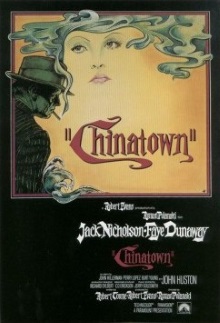
This is the first film by Roman Polanski to be featured on this blog and only the second one I’ve ever watched, after Rosemary’s Baby some years ago. While Polanski can be fairly said to be among the great directors, I’ve been reticent about adding his films to my watch list due to his awful personal reputation. I have no doubt that his films are no good but it’s easy to keep putting off watching them if every mention of his name reminds you that he is still a fugitive from justice. Still, Chinatown is considered one of the best noirs ever made so I know I’d have to get around to watching it eventually.
Jack Nicholson plays J.J. Gittes, a private investigator in Los Angeles who as usual appears to specialize in cases of marital infidelity. One day, a woman comes to his office and asks him to find evidence that her husband, Hollis Mulwray, is cheating on her. Mr. Mulwray happens to be the Chief Engineer of the L.A. Department of Water and Power and Gittes does indeed manage to photograph him in encounters with another, younger, woman. But it quickly becomes clear that much more is going on as Mulwray goes around at night checking the city’s outflow pipes which gush water out from the reservoir while there is a drought going on and Gittes learns that he is the chief opponent of an expensive plan to build a new reservoir. Naturally Mulwray soon turns up dead while the real Mrs. Mulwray, played by Faye Dunaway, claims that she never hired any private investigator. Realizing that he has been set up, Gittes resolves to get to the bottom of a complex case that involves corruption, incest and an ugly tussle over land and water.
One of the first things I noticed is how much the videogame L.A. Noire cribbed from here. Everything from the clothes, the cars and elements of the plot seem to have come from this film. My wife commented that this doesn’t look like any noir she’d ever seen and indeed instead of skulking in the dark shadows of tall buildings in the city, this one is set amidst the sun-drenched desert with its wide open spaces. The stench of sickness and corruption is palpable here, like a rotten piece of fruit that elicits disgust. Between the deserts, the fruit orchards, the importance of water as a resource and even a visit to a luxuriously appointed retirement home to gather clues, Chinatown presents a uniquely Californian flavor of noir that is no doubt one of the main reasons why it is held in such reverence. I really enjoyed how this felt like a rich and complex mystery story that the audience slowly uncovers layer by layer along with Gittes.
Not every detail of the plot stands up to scrutiny. Gittes seems implausibly insouciant of the danger he faces despite having been cut up and shot up by thugs who know who he is and presumably where he lives. I didn’t understand what he hoped to achieve by going alone to the final confrontation with the mastermind behind everything. Fortunately this doesn’t matter too much amidst such a rich tapestry of realistic plot points. The story itself may be fictional but they’re recognizably inspired by real bits from the history of California, such as the disaster of the St. Francis Dam and settlers who were forced to sell their land cheaply when the city diverted away the water that they needed for irrigation. Real-estate theft plots in films are so often frustratingly dumb but this one is sophisticated and still relevant today as California continues to struggle with both water scarcity and gentrification.
Finally I thought that Nicholson was a very interesting choice as the lead. Nicholson isn’t an actor that you cast if you intend for the character to earn the audience’s sympathy. Indeed, I was pleased by how mercenary he seems and how he runs his private investigation firm as just a business, with a real office and staff of his own, unlike almost every other gumshoe in noir films. I’m less of a fan of how in one scene he basically slaps and beats Mrs. Mulwray into telling the truth but I guess he was never meant to be seen as the hero anyway so it kind of fits that he essentially gives her up when pressed. The use of the term Chinatown as a shorthand for corruption and moral ambiguity is more mystifying but I suppose it dates from the old belief that anything Chinese is inherently incomprehensible.
Overall this is understandably one of the best noirs I’ve ever watched and Polanski deserves his reputation as one of the great directors. But that still doesn’t mean that he’s a good person who is entitled to get away with what he’s done.